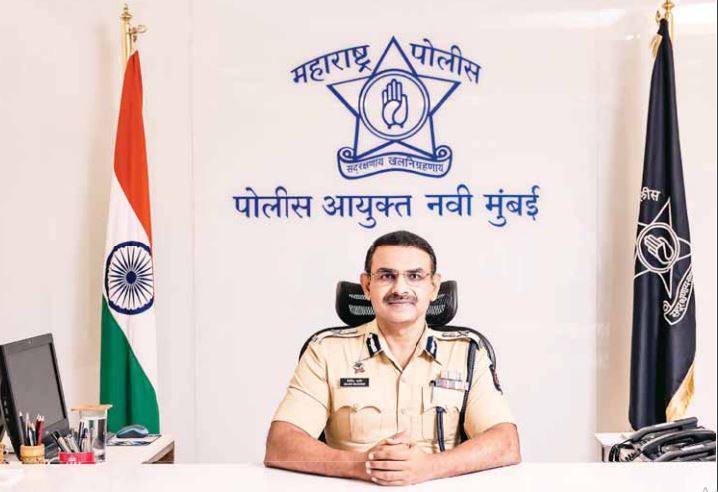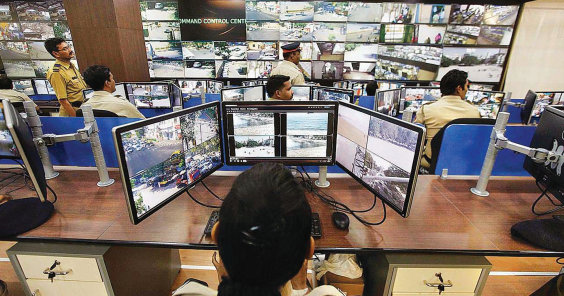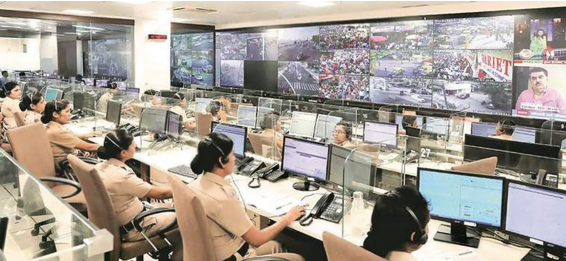Milind Bharambe, the Commissioner of Police in Navi Mumbai, has over 27 years of invaluable experience in law enforcement. He has been at the forefront of introducing transformative changes in police administration, particularly through technology integration, addressing issues such as cybercrime, and the safety of vulnerable sections of society like senior citizens, women, and children.
Satya Swaroop, Managing Editor of The Mumbai PROTECTOR, sat down with Mr. Bharambe to delve into the details of his impactful initiatives and the challenges that comes with the profession.
As CP of Navi Mumbai, you have focused on safeguarding senior citizens, women, children, and enhancing cyber security. What challenges have you faced in addressing these priorities, and what initiatives have you taken to
prevent related crimes?
Since I joined the Force in 1997, I have been passionate about integrating technology into policing. My journey began as ASP Ichalkaranji, Kolhapur, where we initiated process improvements in recruitments, transfers, and postings, emphasising transparency and impartiality. I continued this innovative approach as SP Bundhiya in the Naxal-prone area. However, the height of technological innovation occurred during my tenure as SP Sangli. We achieved a milestone by becoming the first district in the country to attain ISO certification for all police stations, SDPO Offices, and SPO Offices. Implementing 5S management principles and other such strategies was challenging, but crucial for modernising our processes. It is not just about adopting technology but about effectively practicing and implementing it in our daily operations.
How did you overcome
resistance to change?
Implementing an effective change management strategy was key. Cultivating a positive image, building rapport with subordinates, colleagues, and stakeholders, including politicians and the press was equally crucial. This approach drastically reduced resistance.
In Sangli, we employed these techniques, fine-tuning transfers and postings, which became known as the Bharambe Pattern, and served as a model replicated elsewhere.
To attain ISO certification, Shri Sharad Pawar Ji’s support was instrumental. For the first time ever, Zilla Parishads and Corporations received significant funding for certification, amounting to Rs. 5 Crores.
I faced numerous challenges during my tenure as DCP in Mumbai’s Zone 5, characterised by political rallies at Shivaji Park and tensions following the Shiv Sena and MNS split. Managing the headquarters of various political parties, religious sites like Mahim Church and Siddhivinayak Mandir, alongside the aftermath of the 26/11/2008 attacks, demanded adept handling.
What was your involvement during the events of 26/11? Did you work
alongside Mr. Date?
I visited Cama and Albless Hospital, where I later encountered Mr. Sadanand Date. We were operating independently. He was not aware of my presence, and I did not know he was inside, facing danger. I was on the ground during the incident when a grenade was thrown at him. This took place indoors while I was standing outside. I was completely unaware of the situation unfolding inside.
Could you share a timeline of the various posting you have undertaken?
I served as Additional CP Crime Thane during KP Raghuvanshi Sir’s tenure, followed by Additional CP of the West Region at Carter Road Office. Subsequently, I took on the role of Joint CP Traffic, where I introduced innovative technological solutions for traffic management. These initiatives garnered attention and were studied by numerous corporates and city police departments visiting our control rooms.
Transitioning to IG Law and Order in Aurangabad, I spearheaded the implementation of investigative tools like the Investigation Bike System, Yatharth, and m-POLICE – an ERP (Enterprise Resource Planning) system for Maharashtra Police. These were adopted across the four districts in the Range, with discussions underway at DG offices for a Statewide implementation. My tenure as IG Law and Order coincided with the 2019 elections, and later, during the COVID-19 pandemic, I served as IG Law and Order for the entire State.
How did you navigate through those challenging times?
The period was undeniably tough. Amidst the pandemic, we faced the daunting task of facilitating essential movements. Introducing the electronic pass system proved pivotal, facilitating movement Statewide and serving as a model emulated by other States. This system ensured smooth passage for emergency services during the complete lockdown, addressing logistical concerns effectively.
Handling elections and their aftermath presented further challenges. Following the April 2019 elections, contentious issues like Article 370 and Triple Talaq surfaced, each with potential law and order implications. Despite these pressures, we managed the situation adeptly. Subsequently, I transitioned to the role of Joint CP Crime in Mumbai from 2020 to 2022.
During this tenure, alongside addressing challenges posed by the underworld, significant strides were made in combating cybercrime. We established five cyber police stations and regional cybercrime units, significantly bolstering our capabilities in this domain. Additionally, substantial efforts were dedicated to combating narcotics trafficking, laying the groundwork for the results seen today. As Joint CP Crime in Mumbai, our focus was primarily on cybercrime and narcotics enforcement, contributing to a safer city.
How many pending cases did you inherit when assuming your role?
The backlog of underworld cases had significantly diminished by the time I assumed the position. Compared to previous decades, the underworld’s activities had notably reduced, with several major cases successfully resolved. Additionally, efforts were made to apprehend gangsters like Suresh Pujari and Ejaz Lakdawala, further stabilising the situation.
Do you perceive cybercrime and narcotics trafficking as greater threats now?
Indeed, cybercrime and narcotics trafficking pose significant contemporary challenges. While traditional underworld activities have diminished, criminals have shifted focus towards white-collar crimes such as real estate fraud. During my tenure, notable attention was directed towards addressing these emerging threats. One significant milestone during this period was the handling of the Antilia case.
Could you elaborate on the various initiatives undertaken in Navi Mumbai, particularly in cybersecurity?
As CP Navi Mumbai, we prioritised citizen-centric initiatives and effective management strategies. One significant initiative was the introduction of ‘Dial 112’, providing a streamlined response system for individuals in distress. This service significantly reduced our average response time to five and a half minutes within the Navi Mumbai Commissionerate, ensuring swift assistance in emergencies.
Addressing narcotics awareness was another crucial point. We took proactive measures to tackle the involvement of hundreds of African nationals in the narcotics trade, leading to a noticeable reduction in the menace, though it has not been completely eradicated.
In response to the evolving landscape of cybercrime, we initiated several awareness and prevention campaigns. Recognising the surge in financial frauds targeting unsuspecting individuals, we established cyber police stations in Nerul, Panvel, and Vashi. Additionally, we equipped every police station with a dedicated cyber cell to investigate smaller cybercrimes. Strengthening the Economics Offences Wing and establishing a Financial Intelligence Unit further bolstered our efforts to combat financial fraud. This unit actively identifies and addresses Ponzi schemes and other fraudulent activities, engaging with schools, colleges, societies, and malls to raise awareness and prevent financial losses among the public.
Ensuring the safety of women and children was paramount. We established Nirbhaya squads in all police stations, equipped with dedicated vehicles and staffed by female constables to respond swiftly to incidents involving women’s safety. Through extensive social media outreach and awareness campaigns, we aim to educate women about domestic violence, harassment, and cyber-related crimes, providing them with accessible channels like the toll-free number – 112 – to seek assistance and support where they receive immediate response.
Furthermore, we implemented initiatives to support senior citizens, particularly those lacking social support networks. Regular visits from police personnel, security audits of their residences, and education on cybercrime and financial fraud aimed to enhance their safety and well-being, underscoring our commitment to safeguarding all members of the community.
These are wonderful initiatives that send a clear message to the community on the seriousness the police takes in safeguarding the vulnerable. How many police stations currently fall under your jurisdiction?
Currently, there are 20 police stations operating within our jurisdiction in Navi Mumbai, and each of these stations implements the various initiatives we have discussed.
In addition to these initiatives, we also focus on enhancing the efficiency and effectiveness of police administration. Measures such as the Nelson System, Investigation Bike System, Yatharth, and the Digital Evidence Collection System have been implemented to improve transparency, streamline administrative processes, expedite justice delivery, and enhance the productivity of our personnel.
The establishment of the EMC (Evidence Management Centre) ensures proper storage and sequential organisation of all evidence collected from crime scenes, with digitalisation of related documents for ease of access and reference. Furthermore, the m-POLICE application has been developed specifically for police administration, encompassing modules for establishment, administration, operational requirements, and welfare initiatives. This comprehensive system aims to optimise organisational processes and facilitate efficient management across various domains.
Could you elaborate on the steps taken to enhance transparency and reliability in police services and ensure smooth cop-community connect?
Our approach has been to foster transparency and openness, reassuring the public about the reliability of police services. Whether it is passport verification, character verification, or various licenses, we have made significant strides in digitising these processes, ensuring completion within stipulated timelines. By offering these services online, we have eliminated the need for intermediaries or agents. Following the prescribed procedure guarantees timely and efficient service delivery, enhancing trust and cooperation between the police and the community.
Are you satisfied with your tenure?
Yes, I would say there is certainly initial satisfaction. The positive response from the public is particularly heartening. They readily acknowledge positive initiatives taken by the police, especially those aimed at improving services for citizens. It is gratifying to see people benefiting from our efforts. Ultimately, our actions must impact people’s lives positively. If our efforts only serve our interests and do not reach the community, they hold little value. It is essential for our work to resonate with the public and for them to provide feedback indicating its impact on their lives.
How do you maintain your composure despite facing numerous challenging assignments? Do you seek spiritual guidance or practice meditation?
I believe in leading a simple life and strive to contribute positively to society. While I have not been able to maintain a consistent meditation practice, I find solace in giving myself moments of respite. Whether I am playing or working out in the gym, I immerse myself fully in the activity at hand, almost entering a meditative state. For me, the key lies in maintaining focus and concentration on whatever I do. While setting aside dedicated time for meditation is not always feasible, I find that mindfulness in daily activities helps me stay grounded and composed amidst challenges.
How do you view the involvement of ordinary citizens in communicating with the police? How often do you witness this support being extended to law enforcement?
It is essentially a feedback loop. When the police maintain open lines of communication through various channels — whether in person, via post, email, WhatsApp, or social media — and actively engage with citizens by acknowledging and responding to their input, feedback tends to flow more freely. Conversely, if the police are inaccessible or unresponsive, citizens may attempt to reach out a few times but eventually disengage.
As for citizens offering their support to policing efforts, some individuals are keen to contribute in whatever capacity they can during their spare time. This could involve providing meals or other forms of assistance to the police.
During your tenure as CP, I noticed that almost all police stations are open to suggestions. What is your secret?
I believe it is largely about leadership and fostering a culture of openness and accessibility. Each city has its unique culture, and the approach of its leaders plays a significant role in shaping the dynamics within the police force and its interaction with the community.
We have also noticed visible improvement in the police department’s reception towards the public. However, many citizens still expect more from the police. How can this expectation be addressed?
It starts with proactive engagement. By taking the initiative to reach out to the community and actively seeking their input, we can bridge this gap. I am confident that if we make an effort to engage with people, they will respond positively. It is about our willingness to approach them and establish meaningful connections.
Could you share some hobbies you pursue? How do they contribute to your overall well-being?
I have explored various hobbies over time, believing in the richness of experiencing diverse activities. I hold a black belt in karate. In the realm of sports, I have excelled in shooting, winning gold medals in championships. I have also pursued paragliding courses, seeking adventure and new challenges. Currently, I am engaged in golf, finding enjoyment and relaxation in the game. Additionally, I maintain a strict fitness regimen to keep my body in shape. To balance it all, I try to incorporate meditation into my routine to cultivate a calm temperament.
As joint CP Traffic, do you believe relief can be provided to areas like Versova, Amboli, and Saki Naka during peak hours?
The challenges in these areas largely stem from developmental and planning issues. For instance, if infrastructure like Gokhale Bridge is not properly reconstructed or planned, it significantly impacts traffic flow, leaving limited options for the traffic police to address the situation. Moreover, the indiscriminate granting of permissions aggravates these challenges.
Regarding traffic management in Navi Mumbai, it is worth noting that the city benefits from careful planning, which essentially restricts some challenges. Nonetheless, efforts have been made to address existing issues and enhance traffic management. Our DCP Traffic and the dedicated team have been instrumental in implementing initiatives aimed at improving traffic flow. Leveraging my experience as joint CP Traffic, I offer guidance and support to the team as they work diligently to manage traffic effectively. Despite the challenges, Mumbai’s traffic police maintain a commendable culture of dedication and professionalism.
What were the most challenging assignments that have deeply impacted you?
As Joint CP Crime, I encountered numerous challenges that tested my resolve. In previous assignments, the initiatives I spearheaded were largely our own, and their impact might not have been widely acknowledged. However, as Joint CP Crime, we faced considerable scrutiny and criticism, particularly following high-profile cases like Antilia. Despite this, our efforts in combating narcotics and cybercrime were driven by a genuine commitment to serving society.
Did you collaborate with the EOW (Economic Offences Wing) for cybercrime investigations during your tenure as Joint CP Crime?
The Crime Branch primarily handles investigations, including those related to cybercrime. While the EOW deals with economic offenses, cybercrime falls within the purview of Joint CP Crime. The Crime Branch is more focused on practical, field-oriented aspects of investigation, while the EOW tends to be more desk-bound. Both units face challenging cases, but their areas of focus and approaches differ accordingly.
The conviction rate in the EOW often faces challenges, resulting in cases lingering without closure. Can you elaborate on the nature of these challenges?
Certainly, there are significant stakes involved in EOW cases, and the complexity of these challenges contributes to prolonged investigations and trials. This reality underscores the importance of initiatives like Mission Conviction, recently inaugurated in Navi Mumbai by the Deputy CM. The ultimate goal is to secure convictions, providing justice and closure to the aggrieved parties.
You mentioned earlier about a particular case that left a lasting impact on you. Could you elaborate on that?
As CP Crime in Mumbai, the Antilia incident presented a particularly steep challenge, significantly affecting the image of the Mumbai Police. Its reputation of is largely shaped by the performance of its Crime and Traffic departments. While law and order is crucial, it is often taken for granted. Ultimately, creating a safe and secure environment falls under the purview of law and order.
Would you like to share more before we conclude this interview?
Introducing new initiatives within the Department is always a daunting task, requiring extensive groundwork and change management efforts. It is not a straightforward process. Despite the challenges, we have accomplished a lot in Navi Mumbai within a short span. However, effectively communicating and implementing these changes among constables, who are the primary point of interaction with the public, remains a significant challenge. Permeating change within their ranks and managing it effectively is indeed a formidable task






